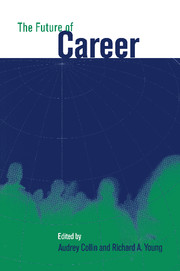Book contents
- Frontmatter
- Contents
- Notes on contributors
- Acknowledgements
- 1 Introduction: framing the future of career
- Part 1 Changing contexts
- Part 2 New perspectives
- 7 The future of boundaryless careers
- 8 Career development in a changing context of the second part of working life
- 9 The future of women's career
- 10 Career or slide? Managing on the threshold of sense
- 11 Epic and novel: the rhetoric of career
- Part 3 New directions for theory, practice and policy
- Author index
- Subject index
11 - Epic and novel: the rhetoric of career
Published online by Cambridge University Press: 06 January 2010
- Frontmatter
- Contents
- Notes on contributors
- Acknowledgements
- 1 Introduction: framing the future of career
- Part 1 Changing contexts
- Part 2 New perspectives
- 7 The future of boundaryless careers
- 8 Career development in a changing context of the second part of working life
- 9 The future of women's career
- 10 Career or slide? Managing on the threshold of sense
- 11 Epic and novel: the rhetoric of career
- Part 3 New directions for theory, practice and policy
- Author index
- Subject index
Summary
The original idea for this chapter arose as I was reading the analysis of the genres of epic and novel by Bakhtin (1981), a major theorist of literature now regularly cited outside that field (for example Gergen, 1992; Jeffcutt, 1993; Potter, 1996; Shotter, 1992). What immediately struck me about Bakhtin's contrast between these two genres was that it could be used to illustrate the changing nature of career. Whereas, during most of the twentieth century, career had been like the traditional epic, it was becoming more like the (nineteenth-century) novel. However, in exploring these genres further, I came across the socio-historical approach to literature of Schlaffer (1989) and Moretti (1996), and this made me aware that these literary forms could perhaps have something even more significant to say about career.
Schlaffer (1989) adopts a ‘ “materialist” theory of aesthetic production’ (p. 5): while respecting the aesthetic individuality of an artistic work, he sees it as a manifestation of a historical problem, as the ‘embodiment of a social contradiction’ (p. 123). Comparing some late eighteenth- and early nineteenth-century works, he concludes that their image of the hero made ‘visible the complex situation of the bourgeois age: the contradiction between the narrowness of its reality and the breadth of its consciousness’ (p. 15). Moretti (1996) takes a similar approach: literature ‘helps reduce [the] tension’ produced by the ‘ethical impediments, perceptual confusions, ideological contradictions’ arising from transformations in society (p. 6). He argues that what he calls the ‘modern epic’, with its digressions, polyphony, and polysemy, makes the tensions of modern, urban, and global experiences of the world more comprehensible and acceptable.
- Type
- Chapter
- Information
- The Future of Career , pp. 163 - 178Publisher: Cambridge University PressPrint publication year: 2000
- 5
- Cited by



